The missed opportunities of the army of Kolchak
The defeat of the corps Bakich
Shortly before the counter-offensive of the Red Army, both sides received information about the plans of the enemy. 18 April 1919, the 25 division's intelligence Chapaeva intercepted white couriers due to secret orders. They reported that between 6 corps of General Sukin and 3 corps of General Wojciechowski there was a gap about 100 kilometers. It was reported that the 6 body begins to turn to Buzuluk. That is, White could stumble upon the shock grouping of the Reds and tie it into battle, destroying Frunze’s plans. The Red Commander planned an attack on 1 on May 1919 of the year. But then White also discovered that the Reds were preparing a counterstrike. One of the red kombrigs, Avayev, ran to the whites and announced plans for a counteroffensive. Upon learning of this, Frunze postponed the attack on April 28 so that the Kolchakites would not have time to retaliate.
However, the first battles began earlier. Wishing to take Orenburg as quickly as possible, the commander of the Southern Army Group Belov, after unsuccessful attacks from the front, he brought his reserve into battle - General Bakich's 4 Corps. White, crossing the river. Salmysh near Imangulov on the extreme right flank of the 20 Infantry Division, was to assist Dutov's Orenburg army from the north in seizing Orenburg. Then in case of luck, cut the railway Buzuluk - Samara. If White could realize this plan, then he would be able to lead the environment of the 1 th Red Army, Guy together with the 5 and 6 corps, and went to the rear of the Frunze shock group. As a result, the corps of Bakich ran into the main forces of Guy’s army, which quickly managed to respond to the threat and go on the offensive.
On the night of April 21, a part of the white forces forced Salmysh on boats. The Reds had an excellent opportunity to crush the enemy corps in parts. The Red Command threw 2 infantry into battle, 1 cavalry regiments, an international battalion reinforced with artillery. The red units during the 24 - 26 battles of April, the villages of Sakmarskaya and Yangizsky, simultaneously routed the Kolchak troops with a sudden strike from the south and north. For April 26 alone, the White Guards lost 2 to thousands of prisoners, 2 guns and 20 machine guns. Remains of white troops fled across the river Salmysh.
Thus, two divisions of whites were almost completely destroyed, part of the whites went over to the side of the red. The 4 Corps was staffed by mobilized peasants of Kustanai district, where they had just crushed a peasant uprising. Therefore, the peasants did not differ in high combat capability, did not want to fight for Kolchak and easily switched to the side of the Reds. Soon it will become a ubiquitous phenomenon and will strike the fatal blow of Kolchak's army. In strategic terms, the defeat of Bakich's troops led to the fact that the rear messages of the Western Army Khanzhin on Belebey were open. And Guy's 1 Army gained operational freedom. That is, by the end of April, the situation in the area of the strike group became even more favorable for the offensive. In addition, the first victories of the Red Army over Kolchak will inspire the Red Army.
Meanwhile, while on the left flank of the army, Khanzhin was threatened, the head of the clip of the Western Army, which had already decreased to 18 –22 thousand bayonets, continued its march towards the Volga, despite signs of a catastrophe approaching. 25 April, the White Guards occupied Art. Chelny near the town of Sergiyevsk, which threatened Kinel - a junction station on the rear railway communication of the entire South Group with its main base. On the same day, the whites took Chistopol. 27 April 2 th corps of whites took Sergiyevsk, and in the Chistopol direction pressed the Reds. This prompted the red command to launch an offensive without waiting for the completion of the concentration of the Turkestan army. In the direction of Chistopol, the right flank of the 2 Red Army was instructed to go on the offensive for the return of Chistopol.
Khanzhin, having received information about the enemy’s counterstroke being prepared, tried to take retaliatory measures. To close the gap in the south, they began to push the 11 Division into it, directing strong reconnaissance groups towards Buzuluk. The commander of the 3 corps was supposed to push the Izhevsk brigade out of its reserve there, placing it on the 11 division. However, these measures were belated and only weakened the white 3 and 6 corps even more. Cover these 100-kilometer gap, these parts could not, they were only substituted by a blow, stretching over a large space.
Counteroffensive on the Eastern Front. Buguruslan operation
28 on April 1919, the Southern Group forces launched an offensive with a combined strike - from the front with units of the 5 Red Army and into the flank and rear of the Khanzhin Army with a shock group in the Buguruslan direction. Thus began the Buguruslan operation of the Red Army, which lasted until May 13. The strike group included 4 rifle brigades, on the right flank they were supported by the 2 cavalry regiment, then the 24-I division was advancing east.
On the night of April 28, the Chapayevites attacked the stretched units of the 11 division of the White Guards. They easily broke through the stretched front of the enemy, smashing the whites in pieces and rushed from south to north, to Buguruslan. The 11 Division was defeated. Her commander, General Vanyukov, reported that there were 250 left on the shelves - 300 people, soldiers were massively surrendering. The adjacent 7-I infantry division of General Toreykin was also defeated. At the same time, the 24 Rifle Division of the Reds piled on the 12 Division of the Whites. Here they failed to crush Kolchak, but the Reds also took up and pressed the enemy to the north, excluding the possibility of maneuvering the 6 corps. In some areas, the White Guards still fiercely fought, especially Izhevsk. But the Reds had a numerical superiority and could bypass such sites, finding gaps or less combat-ready parts of the enemy. 4 May Chapaev liberated Bururuslan. Thus, the Reds intercepted one of the two railroads that linked the Western Army with its rear. 5 May Red repulsed Sergiyevsk.
Frunze He introduced a fresh 2 division into the breakthrough and threw two 5 Army divisions into battle. Orenburg cavalry rushed into the raid, smashing the white backs. Thus, the position of the Western Army Khanzhin became desperate. Whites suffered heavy losses, during the week of fighting whites lost about 11 thousand people in the main line. 6-th corps was actually broken, knocked out. The 3 Ural Corps was also defeated. The morale of the white army was undermined, the combat capability rapidly fell. Those deep negative prerequisites that were originally formed in the army of Kolchak had an effect. As previously noted, in the Russian army Kolchak was a strong personnel shortage. Good managerial, military personnel was not enough.
Mobilized Siberian men, often from the counties where the white punishers passed, more and more often gave up and went over to the Reds. While the White Guards attacked, unity remained. The defeat immediately caused the collapse of the Kolchak army. Whole units passed over to the side of the Red Army. On May 2, Khanzhin informed the Kolchak headquarters that a Kuren (regiment) named after Shevchenko from the 6 corps raised a riot, killed his officers and officers from the 41 and 46 regiments, and took the 2 guns, went over to the Reds. This was not an exceptional case. During the run to the Volga, the White Guard units were exsanguinated. They were replenished replenishment of mobilized forcibly peasants and part of the workers from the front line. The volunteers who formed the backbone of Kolchak's army were largely knocked out during previous battles. The rest disappeared into the new arrivals. Thus, the social composition of the Kolchak army radically changed. The recruits for the most part did not want to fight at all and at the first opportunity gave in captivity or went over to the Reds side. weapons in hand. At the end of April, the white general Sukin noted that “all the reinforcements that have been poured recently have been transferred to red and even took part in the battle against us.”
A completely different picture was observed in the Red Army. Red Army soldiers were inspired by victories. The recruits from the workers and peasants, with a large number of communists and trade union workers, who arrived on the Eastern front, greatly strengthened the army. In the course of the struggle against the white army in the ranks of the Reds, new cadres of talented, enterprising commanders grew up, who reinforced the already existing cadres of the tsarist army. They helped build a new army and smash the whites. In particular, since April 1919, the former head of the imperial army, P. P. Lebedev, was the chief of staff of the Eastern Front, the former general of the old army, F. F. Novitsky, was an assistant to the commander of the Southern Group, and the military engineer was the head of the military engineering work of the front. , former lieutenant colonel of the old army D. M. Karbyshev.
Kolchakites still tried to recoup, stop the enemy, and then attack again. Having no reserves, General Khanzhin requested reinforcements from Kolchak. From Siberia at the disposal of Khanzhin, the only reserve of Kolchak’s army — Kappel's corps, which had not yet completed its formation, was hastily transferred. At the same time, White rearranged the remaining forces of the attack group advancing to the Volga, uniting them under General Voitsekhovsky, creating a defensive line in the region to the west and south of Bugulma. Wojciechowski planned to inflict a flank counterattack on the red. At the same time, units of Chapaev continued the offensive.
9 May 1919, parts of Chapaev and Wojciechowski collided on the river Ik head-on. The 4-I Urals mountain rifle division and the Izhevsk brigade, which remained the main strike force of the Kolchak army, were the strike force of the whites. To help the 25 division of Chapaev, the Reds brought up two more divisions. During the fierce three-day battles, the White Guards were defeated. 13 May Red redeemed Bugulma, cutting another line of the railway and post road - the last communications of the Western Army. Now the white units, who had not yet retreated to the east, had to throw out heavy weapons and property, and leave the steppes and country lanes to escape. The White Guards retreated across the river Ik. The Western army suffered another heavy defeat, but was not yet defeated. The main forces Kolchak departed in the area Belebey.
Thus, in two weeks of fighting, the Red Army achieved impressive success. The enemy advance to the Volga was stopped. The western army of Khanzhin suffered a heavy defeat. The Reds advanced to 120 - 150 km and smashed the 3 and 6 of the Urals, the 2 of the Ufa enemy corps. Strategic initiative passed to the red command. However, there were still heavy battles ahead. Khanzhin's troops concentrated in the Belebey area, Kappel's corps arrived. Here Kolchak's men were preparing for a stubborn defense and hoped, under a favorable situation, to launch a counteroffensive.
Missed opportunities Kolchak
In this case, it should be noted that now the situation has turned upside down. Having defeated the Khanzhin shock group that had been pulled out far ahead, now the reds in the center of the front had a wedge 300 - 400 km of approximately the same width into the “white” territory. After all, on the flanks of the Eastern Front, the situation was still in favor of the whites. In the north, the Siberian army of Gaydy still had local successes. In the south, the White Cossacks continued to attack Uralsk and Orenburg. The Orenburg army of Dutov stormed Orenburg, and in May it united with the Cossacks of the Ural Army Tolstov. Uralsk was blocked from all sides. White Cossacks acted north of the city and threatened the rear of the Southern Reds group. They took Nikolaevsk and went to the Volga. With their advancement, the Cossacks raised uprisings in the Ural region. The commanders of the 1 and 4 of the Red armies proposed to leave Orenburg and Uralsk, to withdraw the troops. Frunze categorically rejected these proposals and ordered to hold the city to the last possible. And he was right. Orenburg and Ural White Cossacks concentrated all their efforts on capturing their “capitals”. As a result, the excellent Cossack cavalry during the decisive battles on the Eastern Front was constrained, was not engaged in their own business - stormed the city fortifications. Cossacks got stuck, not wanting to leave their villages, while the decisive battles were going on in the north.
White command and 14-ths. Southern army group Belova, which continued to stand in the Orenburg steppes. Here, no active actions were carried out, even demonstrative. Although the Belov group could be used for flank counterattack on the strike group of the Reds, support the Wojciechowski group or abandon Tolstov's Ural army for help to take Uralsk and then jointly attack the Reds in the southern direction. This could dramatically complicate the position of the Reds in the central sector of the front. And then the red command has already taken countermeasures. Frunze ordered the strengthening of the Red Army on the southern wing. The Moscow Cavalry Division, the 3 brigade was transferred from the front reserve to Frunze. There were replenishment. Often it was hastily hammered parts, weak, poorly trained and armed. But they were good enough to keep the defense against the Cossacks, not to attack the enemy, but to keep the front.
The potential of the 50-thousandth Siberian army located on the northern flank was not fully utilized by the white command. Commanded the army of Radol (Rudolph) Gaida, the former military assistant of the Austro-Hungarian army, who surrendered and went over to the Serbs. Then he arrived in Russia, became the captains of the Czechoslovak Corps, in May 1918, he became one of the leaders of the anti-Bolshevik uprising of the Czechoslovak legionaries. When the Directory switched to the Russian service and received the rank of lieutenant general. After the military coup began to serve in the army of Kolchak. It was a typical adventurer who used confusion for the development of his personal career. Pretended to be the savior of Russia, formed a magnificent convoy following the example of the imperial. At the same time, he did not forget to fill the trains with various good, gifts and gifts from citizens of cities. Surrounded himself with incredible luxury, orchestras, sycophants. He had no military talents, he was incompetent. At the same time he had a quarrelsome character. He believed that the direction of his Siberian army was the main (Permian-Vyatka). The defeat of Hanjin Gaid even pleased. At the same time, Gaida quarreled with another narrow-minded man (the cadres decide everything!) - D. Lebedev, the chief of staff of Kolchak. When Kolchak's bid began to send Gayde one by one orders to help the Western army, suspend the attack on Vyatka and Kazan, transferred the main forces to the central direction, he ignored these orders. He considered directives received from Omsk to turn the main efforts of the Siberian Army to the south as mediocre and impracticable. And instead of the south, he stepped up actions in the north. Pepeliaev's corps advanced another 45 km and June 2 took Glazov. Vyatka was threatened, but strategically the city was absolutely not needed anymore. As a result, the preservation of the main forces of the Siberian army in the Vyatka sector led to the defeat of the Western Army of Khanzhin, the output of the Red troops to the Siberians and the collapse of the entire Eastern White Front.
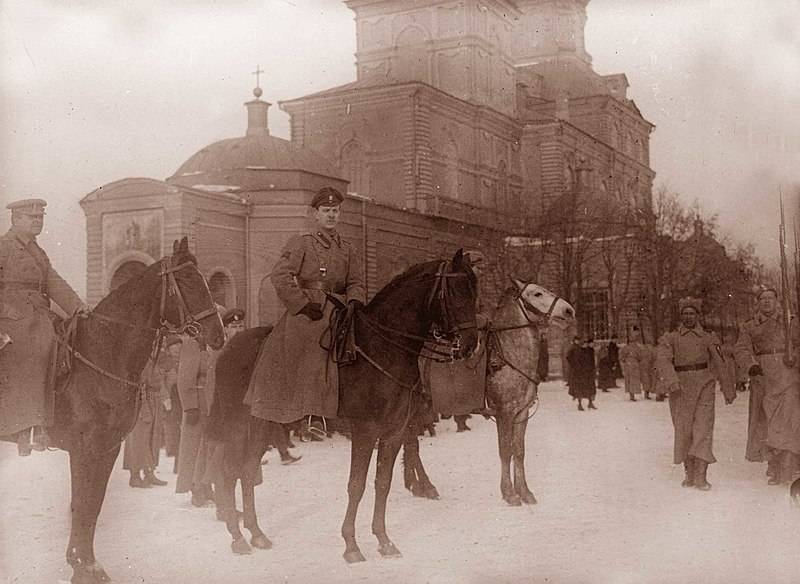
Belebei operation
Meanwhile, the command of the Western Army was still trying to turn the tide in their favor. Khanzhin tried to organize a counterstrike from the east in order to cut down the base of the wedge of the Red Army. For this purpose, the Volga Corps of Kappel was concentrated in the Belebey area.
However, Frunze, having learned about the concentration of enemy forces in the Belebey area, decided to destroy the enemy himself. Before the attack on Belebey, the composition of the Southern group was changed. The 5 Army was withdrawn from it, but two divisions of this army transferred Frunze. The 25 division going to Kama was deployed to advance on Belebey from the north, the 31 division was to advance from the west, and the 24 division that oppressed White's 6 corps from the south. Kappel was under a triple blow and was defeated. He hardly succeeded in completing difficult maneuvers, hiding behind the rearguards and counterattacking, to take his troops out of the "cauldron" and avoid complete destruction.
At the same time, the red command barely helped White. It happened during the change of command of the front. Instead of S. S. Kamenev, A. A. Samoylo (the former commander of the 6 Army operating in the north) was appointed front commander. He arrived with new plans that differed significantly from the plan of the old command of the front and Frunze. Samoilo and Commander-in-Chief Vatsetis, not imagining the entire depth of the defeat of the Western White Army, underestimated the significance of the further attack on the Ufa area, and worried about the situation on the northern flank, began to disperse the forces of the Southern group, withdrawing the 5 army from it. At the same time, the 5 Army was given a different task; it now had to advance north and northeast on the flank of the Siberian Army, to the aid of the 2 Army. At the same time, the enemy should have been attacked by the 2 and 3 of the Red armies.
Meanwhile, a successful breakthrough of the Southern group in the Ufa area would have forced Guyda’s army to begin withdrawal (which is what happened). That is, the new command did not understand the situation. During 10 days, Samoilo issued 5 conflicting directives to the commander of the 5 army Tukhachevsky, changing the direction of the main attack each time. It is clear that there was confusion. In addition, the front command tried to lead separate divisions through the heads of the commanders, to interfere in their affairs. All this made it difficult for the offensive operation. As a result, at the end of May, Samoilo was removed from the front command, Kamenev became the front again.
The Belebei operation ended with the victory of the Red Army. Having broken Kappelev's stubborn resistance, on May 17 the red cavalry of the 3 Cavalry Division liberated Belebey. Kolchak's men hastily retreated to the Belaya River, to Ufa. This allowed the red command to strengthen the troops in the Orenburg and Ural regions and proceed to the Ufa operation.
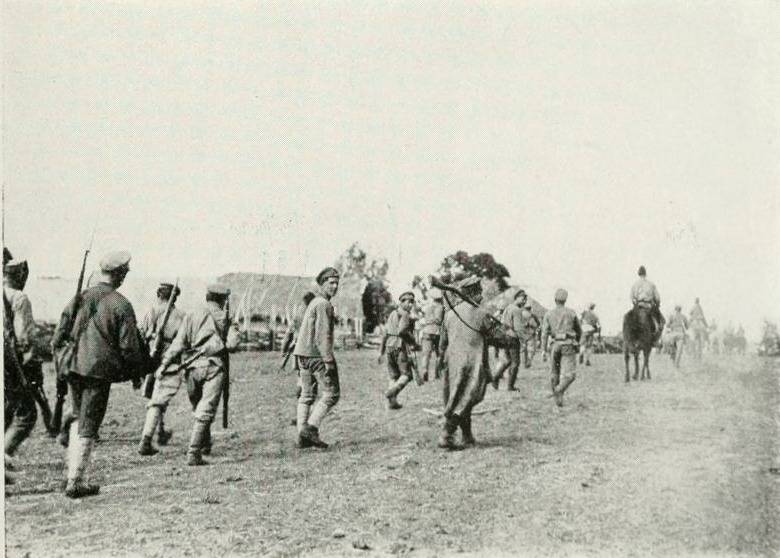
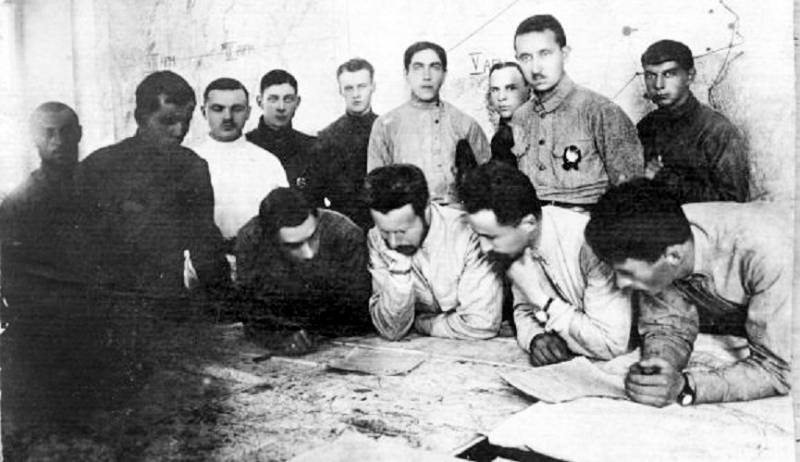
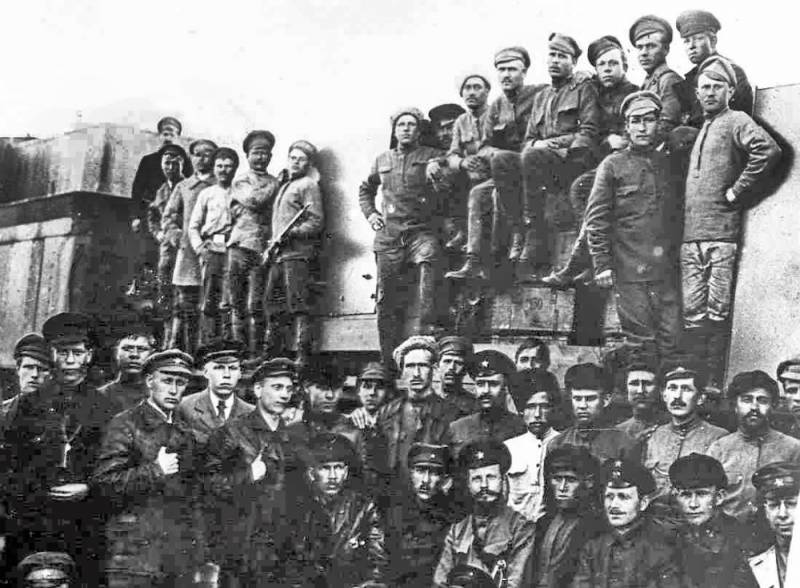
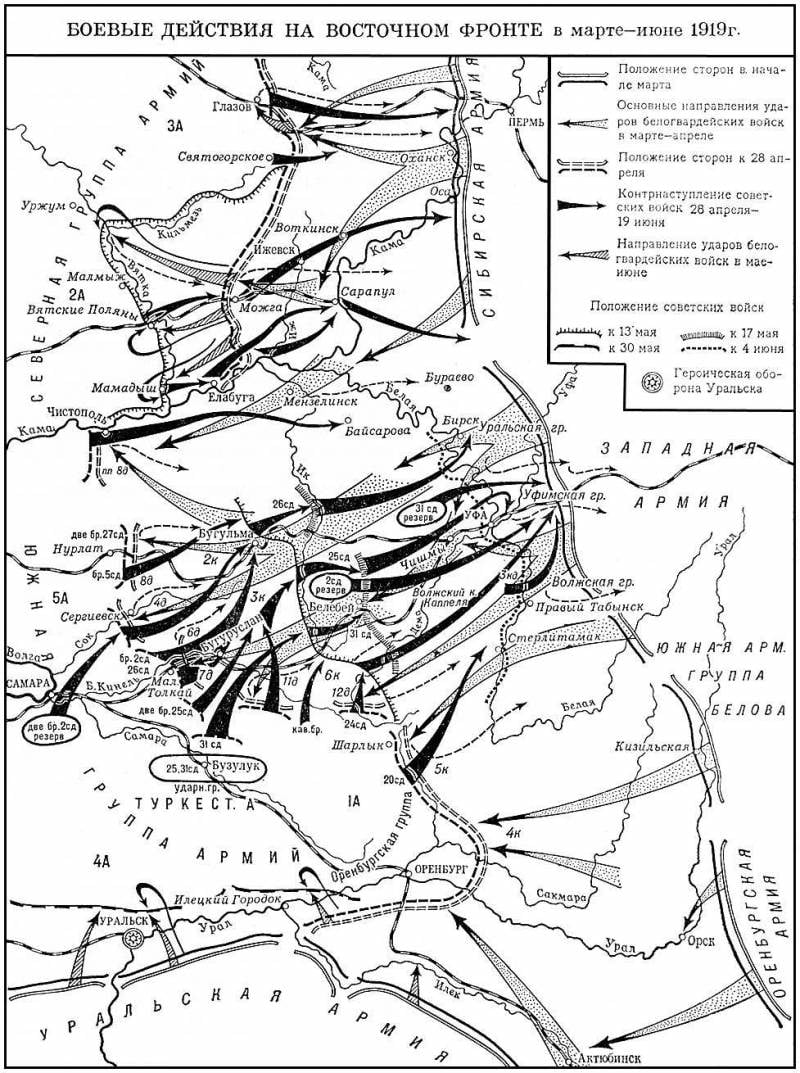
Information